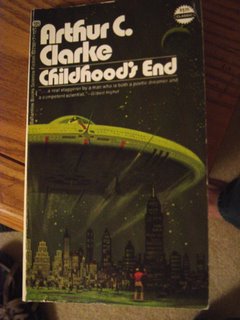Burdened with a preponderance of Incomprehensibly capitalized Nouns, non-sensical dialog, and an aimless, desultory plot,
Conquest of Earth, by the amazingly, and, I'm sure, accurately named SciFi author "Manly Banister," is a torturous trek through a future where the empty, desert surface of Earth is just about as fun as it sounds. It's also proof that you can't judge a book by its awesome, awesome cover.

Spoilers within, not that it matters. Even if you don't listen to me and you try to read this, the book is out of print anyways. As if that weren't enough, the copy that I have is quickly disintegrating.
We begin at the final examination of one "Kor Danay," Scarlet Sage. We quickly learn that he is pretty much Neo from the Matrix sequels. He can fly, explode things with his mind, harness the power of the sun, that sort of thing. He can sense the presence of other humans by listening for their "vibrating electrons." He can stop time by performing a specialized technique which basically boils down to "thinking really, really,
really fast."
A member of The Scarlet Order of Men, his Divisible Mind allows him to harness the powers of the Third Order of Logic. The Men are based in the city of Den-Ver, where they, along with the Blue Brotherhood, plot the destruction and eventual defeat of the invaders and rulers of Earth, the Trisz, with their followers, the Triszmen.
The Trisz, you see, are energy beings who rule the Earth with an iron fist. In the beginning and the back of the book, they are described as "the Trisz... the benevolent Trisz" (Manly is very fond of ellipses), but why they might be described as benevolent is never really explained, as all they ever seem to do is execute people randomly and rule through fear and overwhelming technological superiority.
In any case, they have been stealing all of the water from Earth for centuries, also for reasons that are never really explained. What an entity of pure energy could need water for is beyond me, and, judging from the lack of explanation, beyond Manly himself.
The first section of the book is reminiscent of
A Wizard of Earthsea, as Kor is appointed to a priesthood type position in a town on the Mis-Zou River. He has amazing but seldom used powers, and his position is primarily one of guidance and help for the townspeople. Then, he pays homage to the Trisz rulers and falls in love for no reason with the daughter of the human Lord of the town after evading several assassination attempts from the Triszmen.
Manly fools you into thinking that this will be a book about undermining the all-powerful Trisz, working against them in the shadows while evading discovery and capture. A few chapters later, though, Manly gets bored and introduces the quickly discarded gigantic computer that predicts the future. There are some rhyming prophecies involved; I won't bore you with the details, but I'll just say that the phrase "pots and pans" makes an appearance and Kor escapes from the vaporization chamber by teleporting himself back to the underground city of Sub-Den, under Den-Ver. Using his
mind.
Kor lives here for a while with his girlfriend Soma, the personalityless love interest mentioned above. The Men perform some experiments on him, and Kor grows bored, much like the reader. He dreams of being a Searcher, like his father. Maybe you are confused, because I sure was at this point. The Searchers are Men who fly around outer space looking for places to put human colonies (since Earth is dying from lack of water). His father is someone who has never been mentioned up until this point. Finally Kor gets the job, and sets off in a spaceship propelled by the power of his mind to a tropical paradise where he honeymoons with his new wife.
It isn't long before she is eaten by a Trisz (who are here too, apparently). Kor goes crazy and the third section of the book begins. This section is about how Kor has amnesia and becomes the "Great One" for a tribe of cavemen. He uses his powers to bring deer and rain to the cavemen, and they worship him and give him cavewomen to have sex with. This continues for several agonizing chapters until Kor kills a bunch of Trisz with volcanoes after his cavewoman dies in labor.
Thus begins the fourth and final section of the epic struggle. Kor is swept away to a space station where he is nursed back to health by his friends from Sub-Den. Here, Kor develops a non-sensical plan to stop the Trisz, who now apparently are from another universe where they ate all the stars. They are now in our universe, stealing all the water from Earth, because, well, maybe they are tired of the taste of stars or something? I dunno, it's not important. The Men start a giant construction project, building giant towers on burnt-out stars, and they fight off a fleet of Trisz starships using Kor's sun controlling powers. Then he goes into the Trisz universe and sucks them all up into his mind. The End.
All of this takes place in a scant 125 pages. The entire book seems rushed and disjointed - it's as if Mr. Banister had four or five great ideas for SciFi books, then, instead of fleshing each of them out and making four or five decent books, he lumped them all together into a single really bad one.
In the end, it comes off as one of those stories that really give SciFi and Fantasy a bad name. It's a mediocre plot, with mediocre characters, dressed up with future of the 50s names (like Kor Danay) and future of the 50s concepts (like "vibrating electrons," "divisible minds," and building-sized computers that can tell the future, but in riddles). Skip it, unless you're doing a research project on early SciFi novels or if you want to punish yourself for something. This could probably make up for kicking a small puppy, or robbing a bank.










